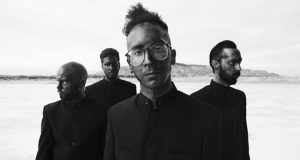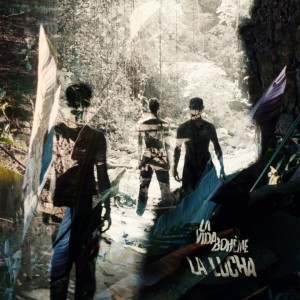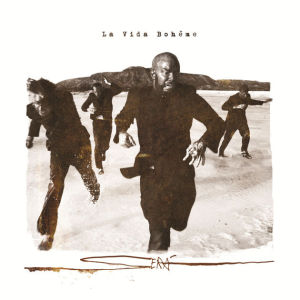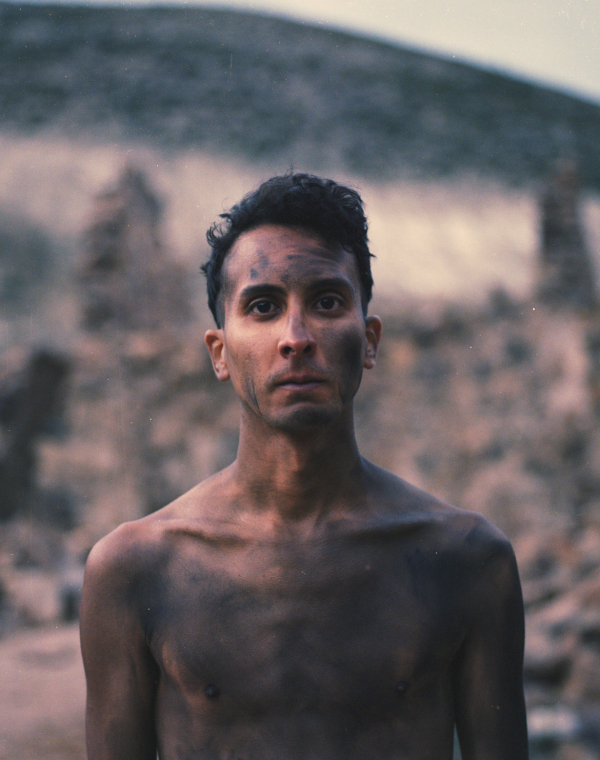BY ERIN BLEWETT Present day Venezuela is a miasma of deprivation, violence and mayhem that has become the de facto legacy of deceased socialist leader Hugo Chávez. Citizens are being kidnapped for profit by criminal syndicates and killed with shocking regularity for speaking out against the government Nicolas Maduro, Chavez’s successor. Venezuela’s beloved La Vida Bohème is known for their high-octane, politically-charged, nouveau New Wave music which eventually got them declared as conspirators against the government on live television. Soon after, their tour manager was kidnapped and their booking agent murdered. As a result, they are now living in exile in Mexico.
La Vida Boheme will be in the City of Brotherly love this weekend when they headline WXPN’s NUEVOFEST at FringeArts on July 16th. The festival is an all-ages, outdoor concert. Doors are at 1 p.m. and the shows will begin at 2 p.m. This year will be the biggest NUEVOFEST to date with eight bands performing that will represent Venezuela, Chile, Colombia and Puerto Rico. Also on this year’s bill is Manchester Mariachi from East Los Angeles which plays mariachi versions of Smiths/Morrissey songs. In advance of their appearance at NUEVOFEST, we sent La Vida Boheme’s Henry D’Arthenay a set of questions asking him to explain what exactly is happening in Venezuela these days, what exactly went down with the band’s booking agent and tour manager and why they are currently living in exile. Here’s what he had to say:
PHAWKER: Please explain what exactly is going on in Venezuela for the benefit of American readers who  may have no clue. Why is there so much unrest, economic misery and anti-government protest?
may have no clue. Why is there so much unrest, economic misery and anti-government protest?
HENRY D’ARTHENAY: Venezuelans have taken the streets to protest the government of Nicolás Maduro and, by consequence, the legacy of Hugo Chávez. You see, our average life in the country from a really long time includes: scarcity of food and medicine, a rampage of violence and insecurity which has made Venezuela the second country with more violent deaths in the world, no separation of power as the political party of Maduro rules the institutions of the country in a biased way (always to their convenience, to the point that when the opposition won congress the government immediately has used the Supreme Court to bypass congress), people are being judged in military trials instead of civil courts and the ties of our government with drug trafficking is, not only concerning, but quite an open reality: the nieces of the president (who controlled the national airport of the country) were captured in Haiti by the DEA trying to traffic 80 kilos of cocaine to the US and Europe.
This crisis happened because our government is corrupt and managed to bankrupt an oil country in record time. We have the worst inflation in the world (800%). They are willing to do whatever it takes to be in power even if it means taking the country down to save their asses (ironic how short minded they are, right?). They have choked the production within the country of food and are unwilling to accept humanitarian help from other countries, in spite of the country going right now through a deep malnutrition crisis (especially with newborns and small children). In more than 80 days of protests there has been almost 80 killed, most by the unlawful use of force by government forces (military and policemen). A big majority of the people killed have been kids that don’t even reach 30 (17 year olds, 22 year olds: young people who wanted a brighter future, or a future at least…a future which has been taken by force from them).
As you can see, we are in the streets defending ourselves from tyrants, defending our right to live freely and become whoever we want to become (political opinions aside: just being able to live without being killed and to buy food with the money we make would be such a huge step for us).
PHAWKER: Even though the band is currently living in exile in Mexico, can you tell us what daily life is like for the average Venezuelan? What was your daily life like before you left in 2014?
HENRY D’ARTHENAY: It’s hard for me to see it as exile. I want to come back to Caracas as soon as possible, personally, to see my family, protest and sort my life out there (something which was kind left on hold because of the band, the situation of the country and our leaving of the country). I can come back…what I don’t know if what I’ve been saying could generate when I enter the country once again. Last time I had to enter through the border with Colombia because I didn’t know if I was subject to any flag in my passport since during that year the vice-president of the country declared me as a conspirator against the government in public tv. In the end it was a smokescreen, but I don’t know if that stills stands just as a smokescreen today as the band is more in the public eye nowadays.
Day to day life in Caracas is more surviving than existing. You have to learn to go with the flow of the  anarchy that rules the country. My most recent memories from being there I can sum up in my last year there: Long clinic days with my mom, a night after playing a show driving really fast because I was being chased by a car really near my the girlfriend’s house, not finding certain medicines and trying to reach out to people who might have them for my mom, at least three days a week without water, maybe twice a week without light, social unrest: protests and barricades blocking the way to the clinic from time to time, hearing news of friends being kidnapped, hearing news of friends being killed, postponing things the band was going to do because of Chávez death, spending a whole month hearing the late Chávez sing rancheras simultaneously in all radio and tv stations (which is very expensive) while seeing the garbage accumulate in the streets I roamed, less concerts by the week, less places to go which you can consider safe, stuck in home, being a nurse and an internet activist (which in hindsight was very weird, didn’t slept well maybe for months). It’s also hard to speak of daily life in Venezuela as, sadly, has been changing every day for the worse since a long time. This outburst of protest gave us back a lot of life and courage that we all needed as the country’s situation can quickly drive you to despair.
anarchy that rules the country. My most recent memories from being there I can sum up in my last year there: Long clinic days with my mom, a night after playing a show driving really fast because I was being chased by a car really near my the girlfriend’s house, not finding certain medicines and trying to reach out to people who might have them for my mom, at least three days a week without water, maybe twice a week without light, social unrest: protests and barricades blocking the way to the clinic from time to time, hearing news of friends being kidnapped, hearing news of friends being killed, postponing things the band was going to do because of Chávez death, spending a whole month hearing the late Chávez sing rancheras simultaneously in all radio and tv stations (which is very expensive) while seeing the garbage accumulate in the streets I roamed, less concerts by the week, less places to go which you can consider safe, stuck in home, being a nurse and an internet activist (which in hindsight was very weird, didn’t slept well maybe for months). It’s also hard to speak of daily life in Venezuela as, sadly, has been changing every day for the worse since a long time. This outburst of protest gave us back a lot of life and courage that we all needed as the country’s situation can quickly drive you to despair.
PHAWKER: Given all the shortages and deprivations of life in Venezuelans tell us about some of the challenges of trying to get your mother medical treatment when she was dying of cancer. (Our condolences, by the way.)
HENRY D’ARTHENAY: Thank you, but It’s ok, it’s the cycle of life: we live we die. It’s in the contract we sign when we get pushed out into the world. The hardest part of my mother’s last years on earth was achieving peace of mind in an environment which is everything but peaceful. My dad, God bless him, had to go though all kind of odysseys to get some of the medications which were absolutely necessary (anti convulsion pills, for example). He always managed to get them no matter how far he had to go or how long he had to stay in long lines to get them.
Cancer, and I think this is a global thing, generates a big community around the people affected by it, and thanks to that community of people going through similar hardships we were able to help each others out when ever something was missing. I also used a lot of my contacts with the band (mainly non profit organizations) which devote themselves in some way to helping out people going through any medical condition by helping them get their medicines to help our every time it was truly impossible to get them at a drugstore.
It was especially scary for my mom each time we had to go to her chemos and there were barricades and protests on the way, sometimes we encountered face to face with them and were able to go through because of some of the kids knowing the band and also seeing that I was in a different situation with my mother. Biggest challenge, I believe, was maintaining good spirits in the midst of it all. Me and my mom really achieved that thanks to Twin Peaks, by the way, it became our escape from our hardships.
PHAWKER: Your tour manager was kidnapped and your friend and former booking agent murdered. Can you explain what happened and why? Is kidnapping and extortion a big problem in Venezuela these days?
HENRY D’ARTHENAY: It has been for a long time a big problem for everyone in the country. Try to look at it like these: the country has been at ruins for a long time, Chávez, Maduro and company made well sure of that, and it was drop by drop the way the jar became empty. The reason they killed our friend and they kidnapped our manager and our tour manager is the same reason the kidnap or kill anybody in Venezuela: “malandros” (which are burglars with a killer twist) do this because it’s profitable in a country without law, they do it because a normal life is not something that will give them what they want so they go out and take it by force, they do it because they can and no one is doing anything to stop them. Most of them are dead by 24, so it’s shakespearian in many ways: they kill with the gun and die by the gun, and endless cycle of violence.
Last year it got to a point where people were so sick of it that started lynching to death any burglars they saw on the act, hanging them and setting them fire, sometimes. In one case, a lady was fighting with her husband on a parking lot and started calling him “burglar” out loud just to piss him off, people who heard the cry of help eventually came and beat the man to death. And this is without speaking of the jails in Venezuela which are going through a deep crisis (most of them maxed out of their capacity, all of them ruled by the prisoners who, with the consent of the state forces, carry on with these activities and coordinate them from jail.) So, yes…it’s a shit storm and has been for such a long time that I have trouble remembering when it wasn’t like this.
PHAWKER: Is there any hope for a solution or some semblance of a happy ending for the people of Venezuela?
Always. We will prevail, don’t be mistaken by the hardships we are living, we were born to overcome them, we were born to overcome our destinies. It will take time, patience, forgiveness, justice and love (so hard when so much hate has been bred), but we will overcome, don’t have the slightest doubt about that. Change takes time. For people to take the streets it took time and events which led to people fighting back the oppressors.
PHAWKER: Can you explain what is happening in this video?
HENRY D’ARTHENAY: People, normal people with wood shields, are fighting back the military which are shooting at them with fire arms. The government has denied the use of them publicly, but as you can see in the video they are being used and they have already killed people with them. Also, they have killed a ton of people with gas bombs (they shoot them either at their heads or directly into their chests). I don’t think there’s much to explain in this scenarios. It’s self explanatory.
PHAWKER: The new album features samples from field recordings you’ve made in the course of your travels. Can you tell us what sounds came from where and if there’s an interesting story connected to those sounds or why you wanted to record them in the first place?
HENRY D’ARTHENAY: They came from different places: sounds from birds at home, sounds of birds at Puerto Rico, the Mediterranean sea and the Caribbean sea, a subway in NYC, the street where we recorded the album (where Eduardo Cabra, the producer of the album lives), a meditation from an unknown man, cellular phones, electronic sounds from the street (lights, static, alarms), a storm in Mexico City. I recorded a lot of things with my portable recorder and it became in a way my sound diary (of my life, of life on earth while I was living there).
We wanted to make a symphony out of daily life, those sounds our environment: we live in them, we live through them. It’s the places/sounds which surround us the ones we end up contributing noise to, so it’s a symbiotic thing which we really wanted to honor in the colors and sounds of the album. Most of the inspiration of the album came from travelogues and films (fiction, docu fiction or documentaries) where sound plays an important part: “Sans Solei” by Chris Marker, “World of tomorrow” by Don Hertzfeldt, “Baraka” by Ron Fricke, so sound (as this big mass of things: harmonic or not) was something we really wanted to capture in the mood of the record.
LA VIDA BOHEME PLAY WXPN’S NUEVOFEST @ FRINGE ARTS JULY 16TH

